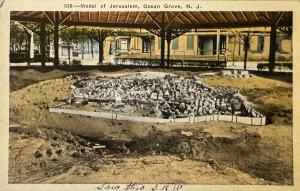 I am paralyzed by choice. I’ve been writing for The CJN for several months now. They have provided me with a seemingly limitless scope of topics from which to choose; essentially, I am to write on any issue of substance and consequence that I can speak intelligently on. And yet, I find it increasingly difficult to decide from article to article what exactly I want to write about.
I am paralyzed by choice. I’ve been writing for The CJN for several months now. They have provided me with a seemingly limitless scope of topics from which to choose; essentially, I am to write on any issue of substance and consequence that I can speak intelligently on. And yet, I find it increasingly difficult to decide from article to article what exactly I want to write about.
I usually wait to see what subject speaks loudest to me as the deadline for my article approaches. Either that, or I call my mom and dad and ask them what they think I should write about. Up until now, neither method has led me astray.
However, this month in particular I had a very tough time trying to decide a specific issue on which to write. I prefer to discuss, not the mere daily events and tribulations of a Jewish student transplanted in Halifax, but broader themes that are generally applicable (and I hope interesting) to more people.
This month, the issue that I have hesitantly chosen to write about is the Rafah border crossing. It seems, to me at least, that the more informed I become of nearly every aspect of the Israeli-Palestinian conflict, indeed of all polemical partisan issues, the more skeptical I am forced to be of all involved. It is nearly impossible for all but the most single-minded people to listen to both pro-Israeli and pro-Palestinian camps and unequivocally maintain entrenched in their opinions.
Jargon from both sides clouds the issue. As is often the case, the truth probably lays somewhere in between. It is the responsibility of every media savvy individual to navigate the empty rhetoric, sift through the media spin and form his or her own opinions.
And yet, what can we really know? Here I sit, in a library on Dalhousie University campus, in Halifax, more then 8,000 kilometers away from the reality on the ground in the Gaza Strip and Israel, and I try to find my own take on what is going on.
I read BBC accounts of the trade blockade and fuel shortage imposed by Israel; I read CNN reports of the potential of terrorists amassing arms in Egypt for use in Gaza; I read Jerusalem Post interviews with those injured by Qassam rockets fired from Gaza; I read Al-Jazeera narratives of the ongoing suffering in the Strip. Once again, I am paralyzed by choice.
There are few undisputed facts in this story. What I am able to conclude confidently, sitting this far removed from the events, piecing reality together from reporters I can’t trust and reporters I’m scared to trust, is that there is suffering on both sides.
The people of Sderot and other Israeli towns have a right to genuinely fear the escalation of terrorist attacks – they live them every day. By the same token, the looks on the faces of thousands of Palestinians streaming through the broken border wall between Gaza and Egypt at Rafah spoke to an unmistakably genuine emotion as valid as the Sderot residents apprehension; for the roughly one and a half million residents of Gaza, this represents their first glimpse of freedom since their border was sealed and their movement regulated.
It is doubtful that even a closure of the border will return Gaza to its previous state. That being said, the closure of Gaza one year ago did not stop the Qassams, either. Heralded as a legitimate prison break by Hamas, the events will go down in history as a crisis only if neither side can learn from them.
It is time that Israel re-thinks its policy in Gaza, moving away from starvation and assassination tactics toward creative ones. At the same time, this is an opportune moment to establish joint border crossings, operated by the Israeli, Egyptian and Palestinian governments, and administered by international organizations.
All interested parties must realize that they are not alone; in reality, all of their concerns are interwoven. Only by working together can they avert crisis and perhaps better the situation for all involved.






